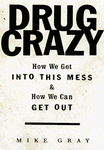
3220 N Street, NW, #141, Washington, DC 20007
| ||
|---|---|---|
| An Open Letter to Barry McCaffrey | ||
| June 11, 1998 | ||
|
AN OPEN LETTER Hand Delivered | ||
|
The Honorable Barry McCaffery Director, Office of National Drug Control Policy The White House Washington, D.C. | ||
| Dear General McCaffery: | ||
| Thirty years after the Vietnam War, former Secretary of Defense Robert McNamara admitted that in the mid-1960s he knew the war was lost. He lamented the lives lost and dollars wasted because of his failure to tell his President and the American people the truth. There is no reason for you to make the same mistake with the drug war. | ||
| Today, we are running an advertisement in The New York Times which states that you and President Clinton are mired in the war on drugs. While casualties and expenditures mount, drug-related problems worsen. The right wing in Congress uses the drug war as a political tool. As a result, the Administration is unable to acknowledge the war is unwinnable and chart a more effective course. You and your colleagues are caught in a quagmire. You cover-up failure, highlight fleeting statistical successes and use that to further expand the misguided war. The ever-escalating war is used to stave off political opponents who try to label the Administration soft on drugs. | ||
| Recently, you recognized the political liability of declaring war on some citizens, and have begun to compare drug use to a societal cancer which must be annihilated. But the new "drug speak" does not change reality: | ||
| ||
| You may not want to call it a war, but it is being fought like one. | ||
| As a soldier you were trained to march in lock step in battle—to stay the course. Now you are a policy maker. You send the soldiers—often police caught in the crossfire of the drug war—into battle. You can keep sending them to fight the drug war or you can tell our President and the public it is time for a fundamental change in course. | ||
| Do you sincerely believe the drug war can be won? | ||
| Before answering read the enclosed book, Drug Crazy. It provides a 100 year history of drug policy in only 200 pages. After you read this book and honestly reflect on your tenure as drug czar, I hope you will recognize that it is time for a dramatic change in drug policy. | ||
| It is time for a policy that invests in our youth, minimizes the harms caused by drug abuse and takes away the profits from illegal drug traffickers. Please face these truths now so history does not judge you harshly. If you'd like help in developing an effective drug control strategy we'd be pleased to assist you. | ||
| Sincerely, | ||
| Kevin B. Zeese | ||
| Advertisement published in the New York Times, June 11 1998 | ||
|
The War on Drugs: Vietnam all over again | ||
| A President and his general locked in a failed policy unwilling to admit the war cannot be won. Lives lost. Billions wasted. Sound familiar? | ||
| As General Barry McCaffery, the drug czar, calls for more troops and more weapons, the dispatches from the front tell us we're still losing in spite of the mounting body count. | ||
| If people aren't in the streets yet, they may be after they read "Drug Crazy" | ||
| In 1978, Mike Gray wrote "The China Syndrome," the movie that blew the lid off the nuclear power industry. Now, "Drug Crazy" is about to do the same thing to the war on drugs. | ||
 Anyone who thinks the war on drugs is succeeding should read this book.
Anyone who thinks the war on drugs is succeeding should read this book.Milton Friedman
Gray brings a filmic sense of drama and action to a gritty, scorching
look at the failure of America's war on drugs.
It shifts the burden of proof from the critics of existing policy to its
defenders. No mean feat!
This is a book that every American should read and take seriously. | ||
|
Paid for by
Common Sense for Drug Policy,
Kevin Zeese, President. Visit www.drugsense.org | ||
|
Common Sense For Drug Policy 3220 N Street, NW, #141, Washington, DC 20007 Phone: (703) 354-5694 * Fax: (703) 354-5695 Email: info@csdp.org |